UCMJ Articles
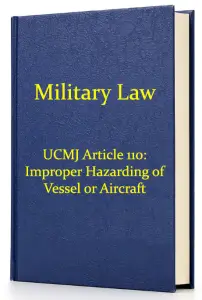
UCMJ Article 110: Improper Hazarding of Vessel or Aircraft
The hazard must have been committed willfully and wrongfully, meaning intentionally and contrary to law, regulation, lawful order, or custom. Negligence is the failure to exercise the care, prudence, or attention to duties which the interests of the Government require a prudent and reasonable person to exercise under the circumstances.
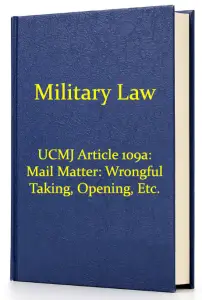
UCMJ Article 109a: Mail Matter: Wrongful Taking, Opening, Etc.
The purpose of Article 109a is to protect the mail and mail system. Mail matter refers to any matter deposited in a postal system of any government or any authorized depository or in official mail channels of the United States or an agency of the United States, including the armed forces. The monetary value of the mail matter is irrelevant.
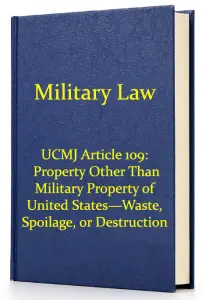
UCMJ Article 109: Property Other Than Military Property of United States—Waste, Spoilage, or Destruction
The wasting or spoiling non-military property section of Article 109 refers to the willful or reckless waste or destruction of the real property of another individual. The terms wastewastes, and spoils refer to acts of voluntary destruction of or permanent property damage. This destruction is punishable whether done willfully, intentionally, recklessly, or through a culpable disregard of the foreseeable consequences.
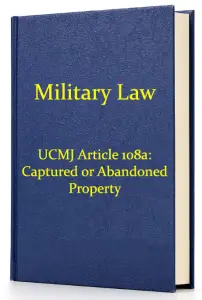
UCMJ Article 108a: Captured or Abandoned Property
Every person subject to military law has an immediate duty to take steps that are reasonably within that person’s power to secure public property for the service of the United States and to protect it from destruction or loss. Immediately upon its capture from the enemy public property becomes the property of the United States. Neither the person who takes it nor any other person has any private right in this property.
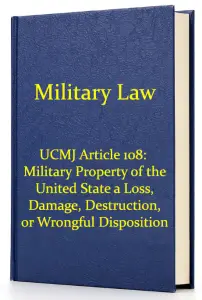
UCMJ Article 108: Military Property of the United States – Loss, Damage, Destruction, or Wrongful Disposition
Value and damage vary and are determined by calculating the amount of damage and the estimated or actual cost of repair by the Government agency generally employed in such work or the cost of replacement, as shown by Government price lists or otherwise, whichever is less. In the case of loss, destruction, sale, or wrongful disposition, the property’s value controls the maximum punishment that may be adjudged. In the case of damage, the amount of damage controls.
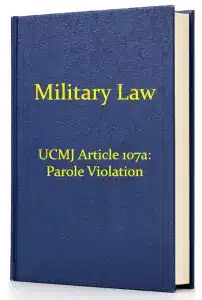
UCMJ Article 107a: Parole Violation
In return for giving their word of honor to abide by a parole plan and conditions, the prisoner is granted parole. A parole violation is committed when the parolee violates the conditions or terms of parole.
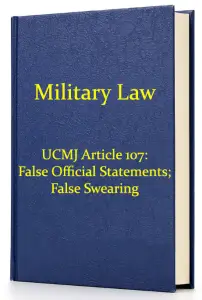
UCMJ Article 107: False Official Statements; False Swearing
The MCM states under Article 107 (False Official Statements; False Swearing), any service member may be prosecuted for false official statements if they:
-
sign any false record, return, regulation, order, or other official document, knowing it to be false or
-
make any other false official statement, knowing it to be incorrect.
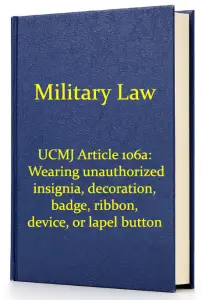
UCMJ Article 106a: Wearing unauthorized insignia, decoration, badge, ribbon, device, or lapel button
Authorization of the wearing of a military insignia, decoration, badge, ribbon, device, or lapel pin is governed by Department of Defense and Service regulations. The wearing of an item is not unauthorized if the circumstances reveal it to be in jest or for an innocent or legitimate purpose. The wearing of an item is “wrongful,” where it is intentional, and the accused knew they did not have a legal justification or excuse to wear the item.
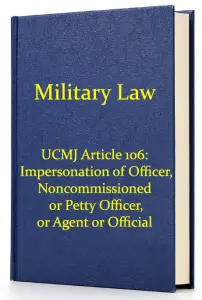
UCMJ Article 106: Impersonation of Officer, Noncommissioned, Petty Officer, Agent, or Official
The impersonation does not depend upon the accused deriving a benefit from the deception or upon some third party being misled, although this is an aggravating factor. The factor of willfulness refers to the accused having knowledge they are falsely presenting themselves as someone they are not.
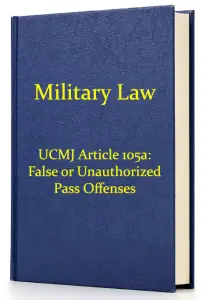
UCMJ Article 105a: False or Unauthorized Pass Offenses
For this article, Military or official pass, permit, discharge certificate, or identification card includes, as well as the more usual forms of these documents, all documents issued by any governmental agency for identification and copies thereof. If any of these documents are deemed false or unauthorized, and the accused possessed them intending to defraud or deceive, they are subject to prosecution.
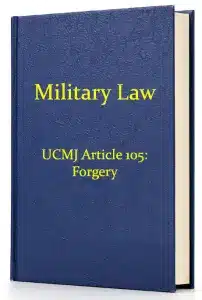
UCMJ Article 105: Forgery
Forgery may be committed either by falsely making a writing or by knowingly uttering a falsely made writing. There are three elements common to both aspects of forgery: a writing falsely made or altered; an apparent capability of the writing as falsely made or altered to impose a legal liability on another or to change another’s legal rights or liabilities to that person’s prejudice; and an intent to defraud.
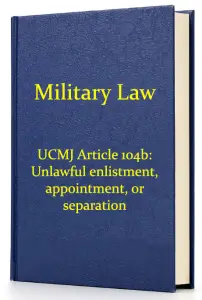
UCMJ Article 104b: Unlawful enlistment, appointment, or separation
Article 104b refers to an enlistment, appointment, or separation prohibited by law, regulation, or order when made and that the accused knew that the person enlisted, appointed, or separated was ineligible.

